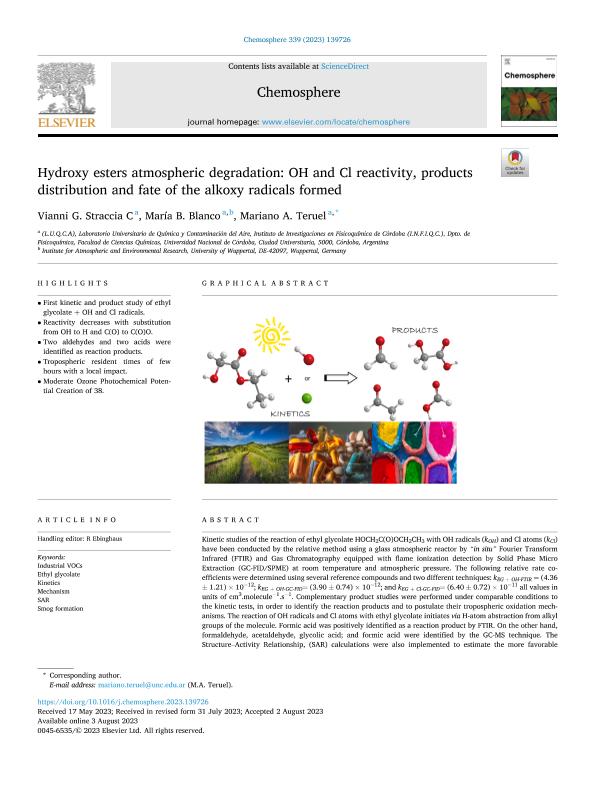Mostrar el registro sencillo del ítem
dc.contributor.author
Straccia Cepeda, Vianni Giovanna

dc.contributor.author
Blanco, Maria Belen

dc.contributor.author
Teruel, Mariano Andres

dc.date.available
2024-02-14T13:44:48Z
dc.date.issued
2023-10
dc.identifier.citation
Straccia Cepeda, Vianni Giovanna; Blanco, Maria Belen; Teruel, Mariano Andres; Hydroxy esters atmospheric degradation: OH and Cl reactivity, products distribution and fate of the alkoxy radicals formed; Pergamon-Elsevier Science Ltd; Chemosphere; 339; 139726; 10-2023; 1-10
dc.identifier.issn
0045-6535
dc.identifier.uri
http://hdl.handle.net/11336/226848
dc.description.abstract
Kinetic studies of the reaction of ethyl glycolate HOCH2C(O)OCH2CH3 with OH radicals (kOH) and Cl atoms (kCl) have been conducted by the relative method using a glass atmospheric reactor by “in situ” Fourier Transform Infrared (FTIR) and Gas Chromatography equipped with flame ionization detection by Solid Phase Micro Extraction (GC-FID/SPME) at room temperature and atmospheric pressure. The following relative rate coefficients were determined using several reference compounds and two different techniques: kEG + OH-FTIR = (4.36 ± 1.21) × 10−12; kEG + OH-GC-FID= (3.90 ± 0.74) × 10−12; and kEG + Cl-GC-FID= (6.40 ± 0.72) × 10−11 all values in units of cm3.molecule−1.s−1. Complementary product studies were performed under comparable conditions to the kinetic tests, in order to identify the reaction products and to postulate their tropospheric oxidation mechanisms. The reaction of OH radicals and Cl atoms with ethyl glycolate initiates via H-atom abstraction from alkyl groups of the molecule. Formic acid was positively identified as a reaction product by FTIR. On the other hand, formaldehyde, acetaldehyde, glycolic acid; and formic acid were identified by the GC-MS technique. The Structure–Activity Relationship, (SAR) calculations were also implemented to estimate the more favorable reaction pathways and compare them with the products identified. Tropospheric lifetimes of τOH = 34 h and τCl = 5.5 days were estimated to determine how these investigated reactions might affect the air quality. In this sense, average ozone production of [O3] = 0.75 and a Photochemical Ozone Creation Potential, POCP, of 38 were calculated for the hydroxyl ester studied.
dc.format
application/pdf
dc.language.iso
eng
dc.publisher
Pergamon-Elsevier Science Ltd

dc.rights
info:eu-repo/semantics/openAccess
dc.rights.uri
https://creativecommons.org/licenses/by-nc-sa/2.5/ar/
dc.subject
ETHYL GLYCOLATE
dc.subject
INDUSTRIAL VOCS
dc.subject
KINETICS
dc.subject
MECHANISM
dc.subject
SAR
dc.subject
SMOG FORMATION
dc.subject.classification
Otras Ciencias Químicas

dc.subject.classification
Ciencias Químicas

dc.subject.classification
CIENCIAS NATURALES Y EXACTAS

dc.title
Hydroxy esters atmospheric degradation: OH and Cl reactivity, products distribution and fate of the alkoxy radicals formed
dc.type
info:eu-repo/semantics/article
dc.type
info:ar-repo/semantics/artículo
dc.type
info:eu-repo/semantics/publishedVersion
dc.date.updated
2024-02-09T12:18:12Z
dc.journal.volume
339
dc.journal.number
139726
dc.journal.pagination
1-10
dc.journal.pais
Estados Unidos

dc.description.fil
Fil: Straccia Cepeda, Vianni Giovanna. Consejo Nacional de Investigaciones Científicas y Técnicas. Centro Científico Tecnológico Conicet - Córdoba. Instituto de Investigaciones en Físico-química de Córdoba. Universidad Nacional de Córdoba. Facultad de Ciencias Químicas. Instituto de Investigaciones en Físico-química de Córdoba; Argentina
dc.description.fil
Fil: Blanco, Maria Belen. Consejo Nacional de Investigaciones Científicas y Técnicas. Centro Científico Tecnológico Conicet - Córdoba. Instituto de Investigaciones en Físico-química de Córdoba. Universidad Nacional de Córdoba. Facultad de Ciencias Químicas. Instituto de Investigaciones en Físico-química de Córdoba; Argentina
dc.description.fil
Fil: Teruel, Mariano Andres. Consejo Nacional de Investigaciones Científicas y Técnicas. Centro Científico Tecnológico Conicet - Córdoba. Instituto de Investigaciones en Físico-química de Córdoba. Universidad Nacional de Córdoba. Facultad de Ciencias Químicas. Instituto de Investigaciones en Físico-química de Córdoba; Argentina
dc.journal.title
Chemosphere

dc.relation.alternativeid
info:eu-repo/semantics/altIdentifier/url/https://linkinghub.elsevier.com/retrieve/pii/S0045653523019938
dc.relation.alternativeid
info:eu-repo/semantics/altIdentifier/doi/https://doi.org/10.1016/j.chemosphere.2023.139726
Archivos asociados
